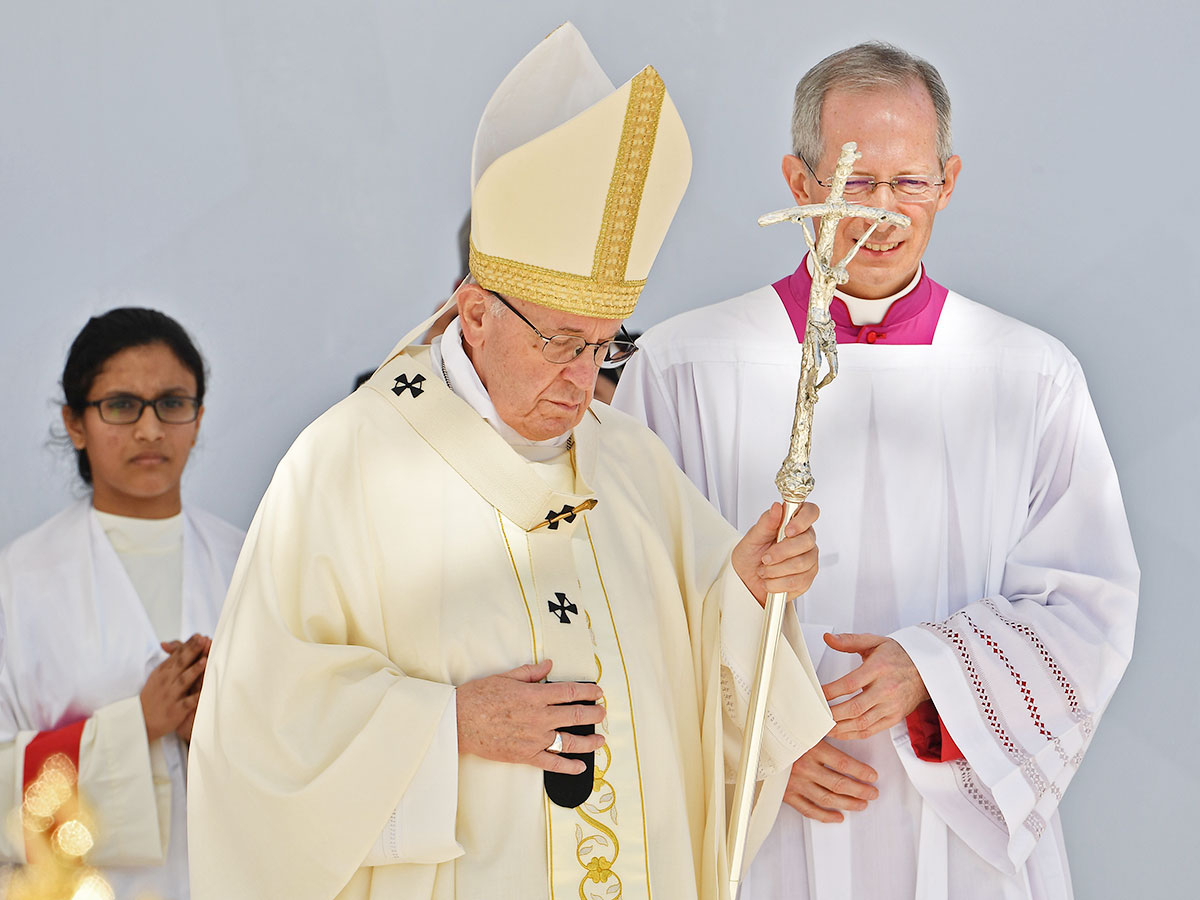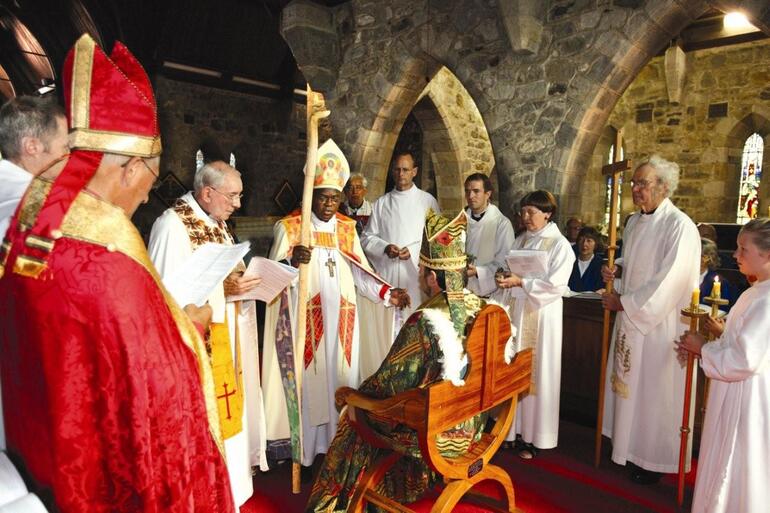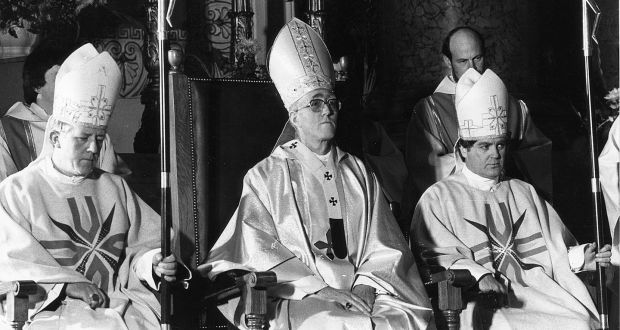Did Jesus have 'daddy issues'?
"You are all brothers. Call no man your father on earth, for you have one Father—the one in heaven"
(Matthew 23:8-9)
Jesus said, “Truly I tell you, there is no one who has left house or brothers or sisters or mother or father or children or fields, for my sake and for the sake of the good news, who will not receive a hundredfold now in this age—houses, brothers and sisters, mothers and children, and fields with persecutions—and in the age to come eternal life."
(Mark 10:29-30)
"Whoever does the will of God is My brother and sister and mother.”
(Mark 3:35)
What do you consider to be the significance of Jesus's instruction that his disciples are to call no man their father on earth? And what does it mean that "fathers" - mentioned in the first segment of the Markan saying as one of the things his disciples must abandon for the sake of the kingdom - are omitted as a class from the new spiritual family of the church, where there will only be brothers, sisters and mothers but not a paterfamilias or human patriarch?
Jesus seems to have taken this teaching quite literally, as can be seen in the passage from Luke where a man states his wish to join the disciples but asks first that he be allowed to bury his father, as mandated by the Torah command to reverence one's parents and the prevailing social custom (practically universal) that one must fulfil one's filial duties by taking care of funerary rites for a deceased father:
Jesus even claimed that his mission involved subverting familial bonds, stating that, "I have come to set a man against his father" (Matthew 10:35). In any culture disrespecting one's own parents is regarded as a negative quality but in ancient Judea among devout Jews, it was deemed to be even more offensive because parental authority was held to be sacrosanct.
The Torah could not have been blunter about the criminality of this breach of the law: "He who insults his father or his mother shall be put to death" (Ex. 21:17); "Cursed be he who insults his father or mother. --And all the people shall say, Amen" (Deut. 27:16); "If a man has a wayward and defiant son, who does not heed his father or mother and does not obey them even after they discipline him, his father and mother shall take hold of him and bring him out to the elders of his town at the public place of his community. They shall say to the elders of his town, 'This son of ours is disloyal and defiant; he does not heed us. He is a glutton and a drunkard.' Thereupon the men of his town shall stone him to death. Thus you will sweep out evil from your midst: all Israel will hear and be afraid" (Deut. 21:18-21).
And in the surrounding Greco-Roman culture, the sacred office of the family patriarch was perhaps even more important again. As the historian Proessor Larry Siedentop explained in his 2014 book entitled Inventing the Individual:
Why did Jesus appear to harbour such fierce opposition to the ancient institution of fatherhood in particular?
Some scholars consider fathers to “represent patriarchy, the old society in which the man alone ruled and decided. In the new family of Jesus into which the disciples are to grow there can no longer be anyone who dominates others.” (Gerhard Lohfink 2014). In their analysis of Mark 10:29–30, Osiek and Balch conclude, “The old family included a patriarchal father; the new one does not, since God is the only Father.” Professor Elisabeth Fiorenza likewise opines that, in the answer of Jesus, “fathers” are among those to be left behind; “fathers” are not included in the new kinship to which the disciples aspire. For Fiorenza this is an implicit rejection of the power and status of patriarchal structures in the messianic community.
If this is correct, does this have any bearing for how our church hierarchies are structured? And how might this conflict, or alternately be reconciled with, the fact that Jesus - out of a diverse base of followers including many women who travelled with or bankrolled his ministry - chose twelve males to be his chief group of insider apostles and that the church evolved to become a socially stratified patriarchy under a 'holy father' and various lesser 'fathers' in the form of bishops and priests?
"You are all brothers. Call no man your father on earth, for you have one Father—the one in heaven"
(Matthew 23:8-9)
Jesus said, “Truly I tell you, there is no one who has left house or brothers or sisters or mother or father or children or fields, for my sake and for the sake of the good news, who will not receive a hundredfold now in this age—houses, brothers and sisters, mothers and children, and fields with persecutions—and in the age to come eternal life."
(Mark 10:29-30)
"Whoever does the will of God is My brother and sister and mother.”
(Mark 3:35)
What do you consider to be the significance of Jesus's instruction that his disciples are to call no man their father on earth? And what does it mean that "fathers" - mentioned in the first segment of the Markan saying as one of the things his disciples must abandon for the sake of the kingdom - are omitted as a class from the new spiritual family of the church, where there will only be brothers, sisters and mothers but not a paterfamilias or human patriarch?
Jesus seems to have taken this teaching quite literally, as can be seen in the passage from Luke where a man states his wish to join the disciples but asks first that he be allowed to bury his father, as mandated by the Torah command to reverence one's parents and the prevailing social custom (practically universal) that one must fulfil one's filial duties by taking care of funerary rites for a deceased father:
To another he said, “Follow me.” But he said, “Lord, first let me go and bury my father.” But Jesus said to him, “Let the dead bury their own dead; but as for you, go and proclaim the kingdom of God.”
(Luke 9:59-60)
(Luke 9:59-60)
Jesus even claimed that his mission involved subverting familial bonds, stating that, "I have come to set a man against his father" (Matthew 10:35). In any culture disrespecting one's own parents is regarded as a negative quality but in ancient Judea among devout Jews, it was deemed to be even more offensive because parental authority was held to be sacrosanct.
The Torah could not have been blunter about the criminality of this breach of the law: "He who insults his father or his mother shall be put to death" (Ex. 21:17); "Cursed be he who insults his father or mother. --And all the people shall say, Amen" (Deut. 27:16); "If a man has a wayward and defiant son, who does not heed his father or mother and does not obey them even after they discipline him, his father and mother shall take hold of him and bring him out to the elders of his town at the public place of his community. They shall say to the elders of his town, 'This son of ours is disloyal and defiant; he does not heed us. He is a glutton and a drunkard.' Thereupon the men of his town shall stone him to death. Thus you will sweep out evil from your midst: all Israel will hear and be afraid" (Deut. 21:18-21).
And in the surrounding Greco-Roman culture, the sacred office of the family patriarch was perhaps even more important again. As the historian Proessor Larry Siedentop explained in his 2014 book entitled Inventing the Individual:
The [Roman] paterfamilias (father) was originally both the family’s magistrate and high priest, with his wife, daughters and younger sons having a radically inferior status.
Inequality remained the hallmark of the ancient patriarchal family. “Society” was understood as an association of families rather than of individuals.
Inequality remained the hallmark of the ancient patriarchal family. “Society” was understood as an association of families rather than of individuals.
Why did Jesus appear to harbour such fierce opposition to the ancient institution of fatherhood in particular?
Some scholars consider fathers to “represent patriarchy, the old society in which the man alone ruled and decided. In the new family of Jesus into which the disciples are to grow there can no longer be anyone who dominates others.” (Gerhard Lohfink 2014). In their analysis of Mark 10:29–30, Osiek and Balch conclude, “The old family included a patriarchal father; the new one does not, since God is the only Father.” Professor Elisabeth Fiorenza likewise opines that, in the answer of Jesus, “fathers” are among those to be left behind; “fathers” are not included in the new kinship to which the disciples aspire. For Fiorenza this is an implicit rejection of the power and status of patriarchal structures in the messianic community.
If this is correct, does this have any bearing for how our church hierarchies are structured? And how might this conflict, or alternately be reconciled with, the fact that Jesus - out of a diverse base of followers including many women who travelled with or bankrolled his ministry - chose twelve males to be his chief group of insider apostles and that the church evolved to become a socially stratified patriarchy under a 'holy father' and various lesser 'fathers' in the form of bishops and priests?
Last edited:



